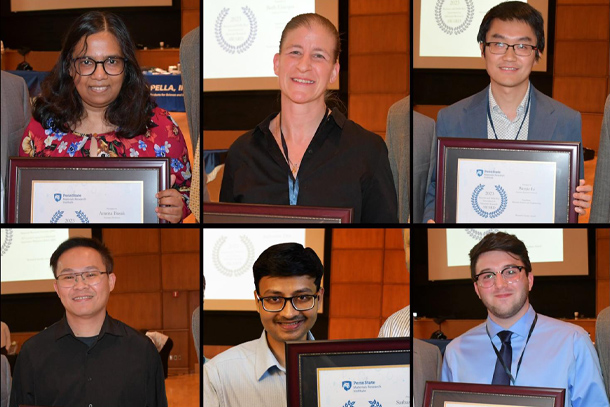
2023 Roy Award winners include, clockwise from top left, Amrita Basik, Elizabeth Elacqua, Wenjie Li, Seng Huat Lee, Sarbashis Das and Tyus Yeingst. Credit: Materials Research Institute. All Rights Reserved.
Engineering faculty and students among 2023 Materials Research Award winners
December 6, 2023
By Jamie Oberdick
Editor’s note: A version of this story originally appeared on Penn State News.
UNIVERSITY PARK, Pa. — One faculty member and two graduate students from the Penn State College of Engineering are among the six materials researchers that received the 2023 Rustum and Della Roy Innovation in Materials Research Award. The award is presented by the Materials Research Institute (MRI) and recognizes recent interdisciplinary materials research at Penn State that yields innovative and unexpected results.
The award includes three categories: Early Career Faculty, Non-Tenure Faculty, and Research Staff and Graduate Student. It exists thanks to a gift from Della and Rustum Roy, who are both late alumni of Penn State’s College of Earth and Mineral Sciences and were long-serving faculty in the college. Winners were announced at the 2023 Material Day event in October.
The College of Engineering recipients, listed below, spanned two of the three categories.
Early Career Faculty category
Amrita Basak, assistant professor of mechanical engineering
Basak’s work is built around high-impact transdisciplinary research that addresses the global requirement of sustainable manufacturing in power generation, propulsion, defense, energy storage and construction. For metals, her research group uses laser powder bed fusion and laser directed energy deposition techniques to process high-performance materials such as iron and nickel alloys and oxide-dispersed strengthened alloys. Her research group is also interested in learning what makes certain materials have superior properties and how to use them.
“Our research has the potential to improve properties of parts fabricated by 3D printing reducing cost and material wastage,” Basak said. “These would result in higher performance. For example, if we can make parts that can withstand high temperatures, gas turbines' efficiency would increase.”
Graduate Student category
Sarbashis Das, graduate student in electrical engineering
Das's research includes work to start a 2D materials foundry which will make the high-quality films grown by MRI’s Two-Dimensional Crystal Consortium Materials Innovation Platform available to the commercial marketplace. This was inspired by his participation in the National Science Foundation’s Innovation Corps program, which is for university-based researchers interested in exploring the commercialization potential of their work. His research also involves developing commercial artificial intelligence-aided graphene chemical sensors for use in real-time detection of food spoilage, adulteration and contamination in food processing facilities.
"Our efforts will potentially lead to the mainstream adoption of 2D materials and their fascinating properties to solve real-world challenges,” Das said. “The use of 2D materials for real-time food spoilage sensors will enable us to tackle the global problem of food safety in a scalable and sustainable manner. Apart from food, this technology could have broad applications such as real-time monitoring of corrosion in critical infrastructure, which will improve public safety."
Tyus Yeingst, graduate student in biomedical engineering
Yeingst’s research focuses on biomaterials, specifically hard polymers, hydrogels and nanoparticles. The applications of these biomaterials are for tissue regeneration and cancer treatment. These materials are controlled using high-intensity focused ultrasound and near-infrared light to properly deliver and release the therapeutics. Along with his Roy Award, he was recognized as one of six Penn State graduate students to win the prestigious National Defense Science and Engineering Graduate Fellowship.
“Applications for my research include bone regeneration for those suffering from aging, osteomyelitis, cancer and battlefield injuries,” Yeingst said. “Cancer treatment also covers a large base of the population, as everyone knows someone or is someone who has been affected by cancer.”



